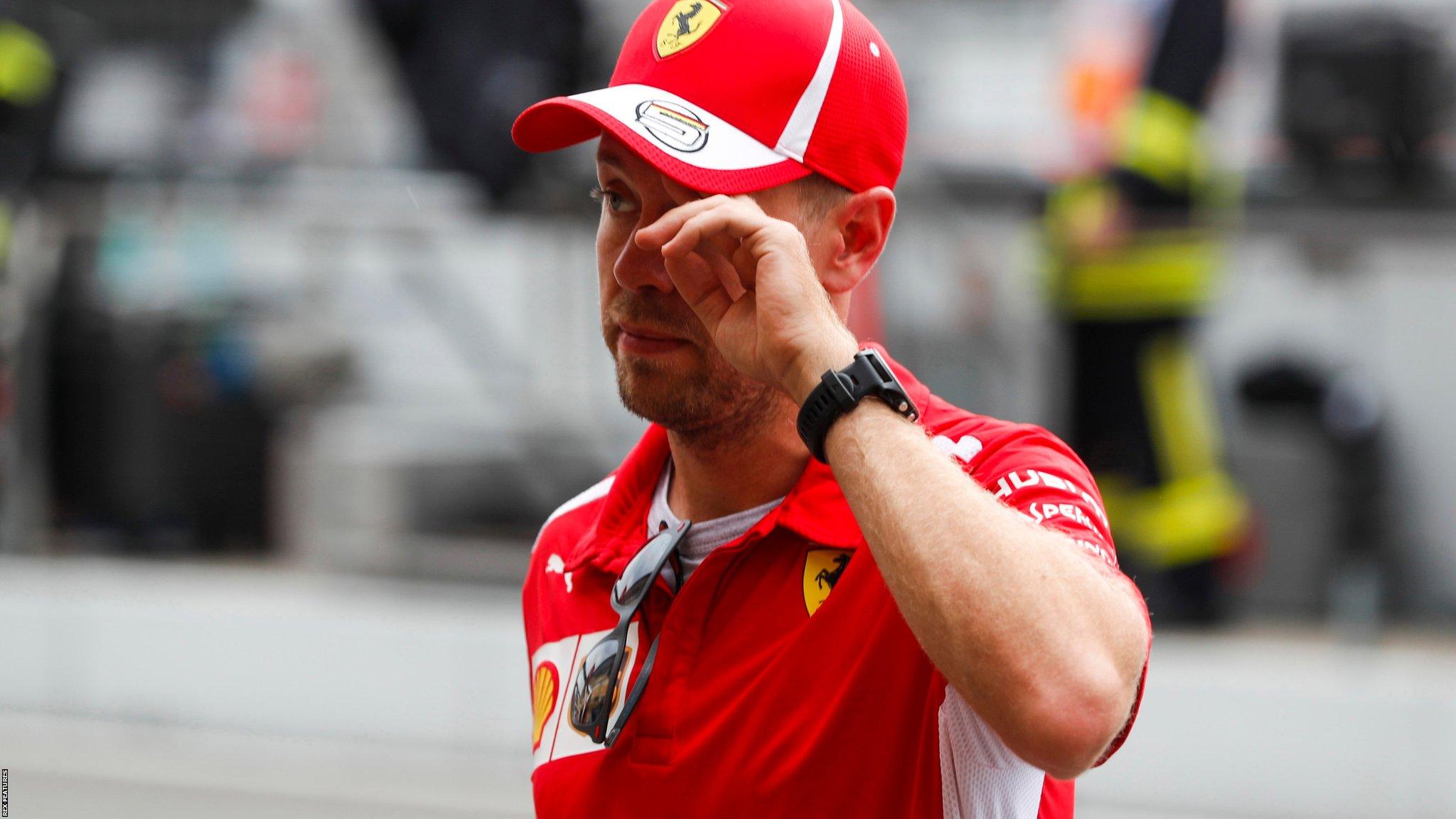German GP: Jolyon Palmer column - Passion, brilliance & costly mistakes
- Published
- comments
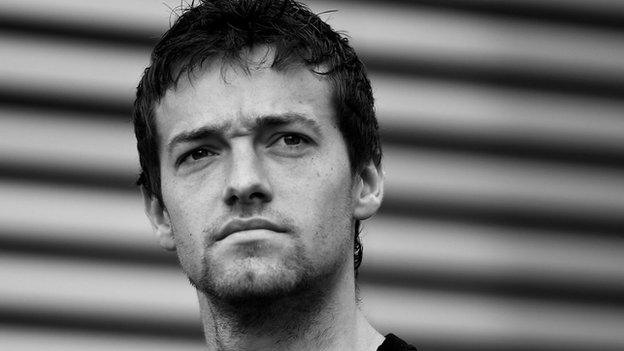
Former F1 driver Jolyon Palmer, who left Renault during the 2017 season, has joined the BBC team to offer insight and analysis from the point of view of the competitors.
I love sport because of the emotion, the passion, the highs, the lows, the moments of brilliance and the costly mistakes. At the German Grand Prix, all that happened in just 24 hours.
First, there was the drama of qualifying. Lewis Hamilton, who was already on a tough run in recent grands prix, had more bad luck.
A non-finish in Austria after a torrid race he had initially led, and then defeat in his home race at Silverstone last time out had left the Mercedes driver slightly on the back foot in his championship fight with Ferrari's Sebastian Vettel.
But bad luck hit again in qualifying on Saturday in Germany. This time, it was a hydraulic leak and it meant Hamilton was consigned to starting 14th.
These things happen from time to time. In fact, before Austria, Hamilton had been in the extremely fortunate position of not having a retirement caused by a mechanical issue since his costly engine failure of Malaysia 2016. However, the hurt was very obvious in this case.
I was racing for Renault when Hamilton's engine blew in Malaysia, effectively costing him the title to team-mate Nico Rosberg. He caused a bit of a storm when he complained on television about it, saying "something or someone doesn't want me to win this year". But I don't remember his reaction being as downbeat and as low as he was after qualifying on Saturday.
Anguish for Hamilton; a high for Vettel
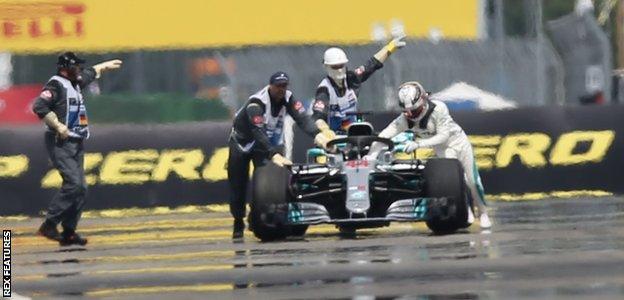
Hamilton suffered hydraulic failure in the first part of Saturday's qualifying session and started the German Grand Prix from 14th on the grid
On Saturday, Hamilton was so desperate to get back to the pits he started pushing the car back - when he still had more than a third of the lap to go! It was never going to work.
The desperation was clear, and so was the despair as his car was ultimately pushed by the marshals to the side of the track so qualifying could resume without him.
Hamilton did his now trademark crouch down against the car, head bowed, and looked a figure of misery.
The fallout from it, with everyone trying to ascertain whether it was his fault or not, did nothing to lift his mood either.
At first, it looked as though Hamilton had caused the failure by running over the kerbs. Mercedes initially said as much before both team and driver concluded the car had already failed, which caused the kerb-bouncing incident.
Ultimately, it didn't matter. The damage was done. But Hamilton seemed affected. He posted Nelson Mandela quotes about the meaning of love and hatred on his Instagram page, and what was a bad day seemed to be spiralling emotionally out of control.
The contrast on Saturday was Vettel.
He took a brilliant pole position in front of a rejuvenated German home crowd, the biggest I've seen at Hockenheim by far (I wasn't around for the Michael Schumacher glory days).
The eruption as Vettel crossed the line to take pole was loud - loud enough for Hamilton to hear and deepen the wounds of a torrid day.
Fate turns on its head
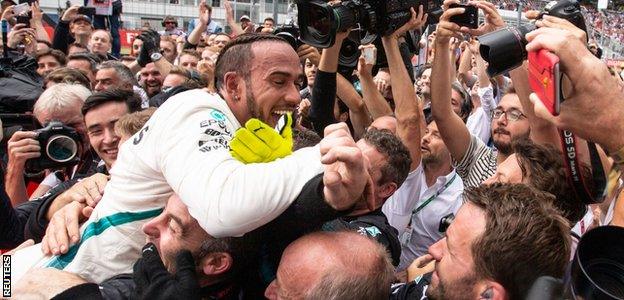
From 14th to first, this was a massive win for the four-time world champion
The key thing for professional sportsmen is to deal with adversity. It happens to everybody at some point to varying degrees.
I had a turning point in my career when I acknowledged I could no longer control anything that had already happened. It seems such a simple, obvious thing, but there's no point holding on to the frustration of days gone by or thinking about what could have been.
You don't need to forget about the past; it's good to learn lessons from it. But whenever a new session or a new day comes it's all about maximising what you can do on that day.
On Sunday, Hamilton did exactly that. Starting 14th, with the pace advantage of the top three teams over the others and with Daniel Ricciardo starting from the back in a Red Bull, a good haul of points was surely the minimum expectation, so long as he kept his nose clean through the opening few corners in the midfield melee.
Top five; minimum. A podium? Possibly. But a win? Surely no chance.
Well, just over an hour and a half after the lights went out, Hamilton was somehow coming back with that win. As he celebrated, his engineer Pete Bonnington declared "miracles do happen, mate" over the radio.
Hamilton's great drive
But this was no miracle. This was pure determination from a driver who had firmly put his bad luck behind him. His first stint was crucial, keeping his soft tyres alive while others struggled, and matching the Ferraris for pace on much older tyres even after they had pitted for new.
That meant Hamilton could pit for new ultra-soft tyres just as it started raining and the track began to get slippery, and with that his pace was electric. Hamilton always shines when it rains, and at times he was lapping three seconds a lap faster than those ahead of him.
Even without Vettel going off it's conceivable Hamilton could have won the race, such was his pace in the conditions.
The rain teemed down after the podium celebrations, but Hamilton didn't care. He was still celebrating with fans, amid lightning forks and claps of thunder.
The same fans had cheered Vettel to pole 24 hours before. They had witnessed not only a fantastic race, but a fantastic performance from a driver who had been through all the emotions in that same period.
A costly error from Vettel
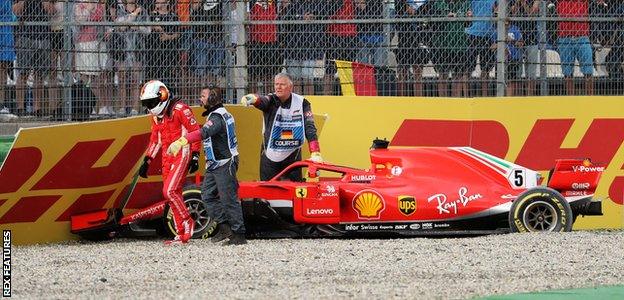
Vettel went from first to out after a crash on Turn 13 of Lap 52
The contrast on Sunday was again Vettel.
He led from the front and, barring some needly exchanges between himself, the team, and team-mate Kimi Raikkonen, he was in complete control… until lap 52.
When you are on untreaded, 'slick' tyres and it starts raining, they are the hardest conditions in racing. There is now enough rain to pit for treaded 'wet' tyres - as others had done erroneously - so you just have to slither around on a tyre that isn't designed for the conditions, with a tiny margin for error.
Vettel got it wrong. He misjudged the conditions, braking too late into Sachs Kurve, a notoriously punishing corner in the Stadium section of Hockenheim, and ended up in the wall.
He immediately started swearing and hitting the steering wheel in frustration and sounded almost in tears as he apologised to the team for the crash.
It was a triple whammy of pain. Firstly, crashing out of the lead of the race. Secondly, because it was his home race, one that meant so much and he had crashed out right in front of the bulk of the 120,000 fans. Thirdly, because he then had to watch Hamilton drive flawlessly to take all the plaudits and a 17-point championship lead as well.
What could have been.
How does Vettel bounce back?
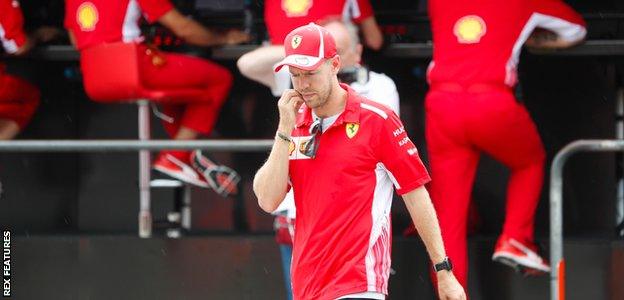
Vettel says he won't have trouble sleeping after crashing out of the German Grand Prix
Vettel must now move on, just as Hamilton did before the race.
It was a very different accident to his one in Singapore last year, when he arguably triggered a multi-car pile-up at the start, but in many ways it is a similar situation.
In Singapore, Vettel started on pole and Hamilton was fifth and up against it. And, just as in Germany on Sunday, Vettel crashed out and Hamilton won. It seemed like a turning point in the championship as Vettel never recovered.
While there are similarities, this year feels different. Not least because Ferrari are more competitive on the whole. But Vettel really needs to hit back this weekend in Budapest.
A 17-point lead in the championship at the halfway point is tiny, almost irrelevant. But if Hamilton wins at the Hungaroring on Sunday and anything happens to Vettel, the lead could leap up to 42 points at the summer break. The gap would go from almost irrelevant to very big, almost insurmountable.
It's a good thing for Vettel that he needs to wait only a few days to be back in the car and making amends. As a driver, the worst thing is to make a mistake and be left stewing on it for too long without a chance to rectify it.
A season to savour
This brilliant season has been an epic two-way fight for the title between the giants of the sport - Hamilton versus Vettel; Mercedes versus Ferrari.
It's been a wonderful year full of twists and turns and I'm sure there are plenty more to come.
But in so many championships you can look back with hindsight at a key moment that decided the destination of the title.
On Saturday, everyone was wondering whether Hamilton's hydraulic failure could be a turning point in the season. Clearly now it won't be.
Instead, the question marks are all about whether Vettel's crash will be the decisive moment of the season. It's up to him to respond now in the same way Hamilton did on Sunday and ensure it won't be.
- Published23 July 2018
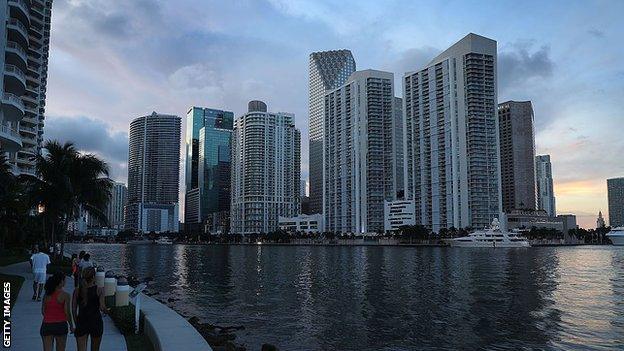
- Published22 July 2018
- Published22 July 2018
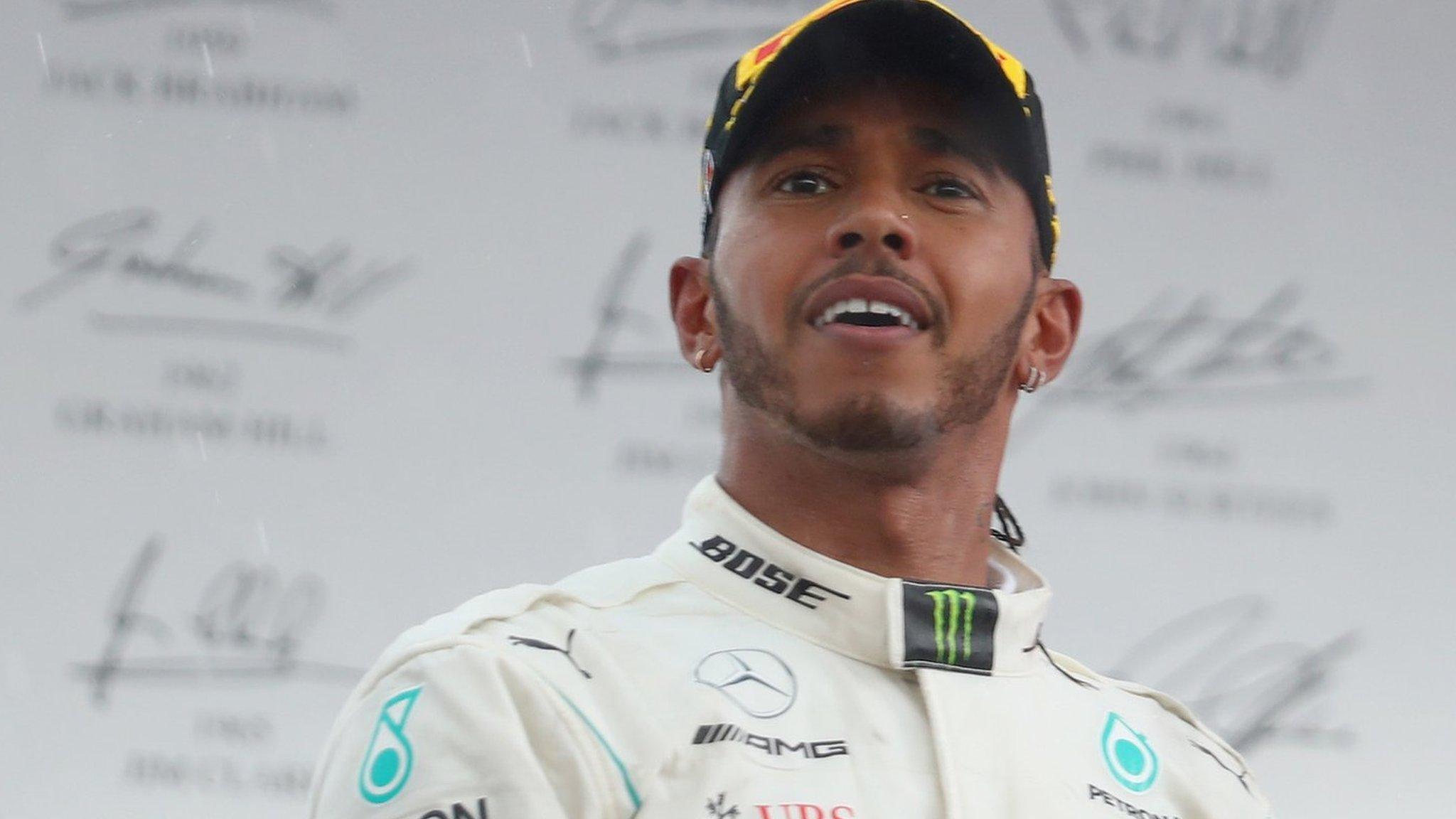
- Published22 July 2018
